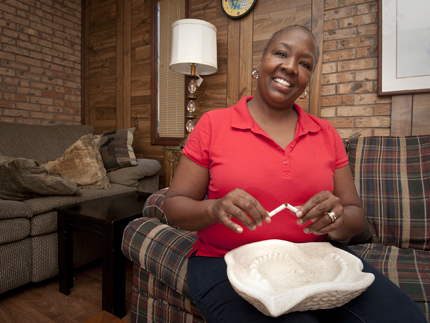UMMC's ACT Center helps patients kick tobacco, make homes smoke-free

Jackson resident Veronica Lane started smoking when she was 12, and it took the better part of 40 years for her to get tobacco out of her life for good.
“My mom and dad used to smoke. They’d give me a cigarette to light for them on the stove, and I’d take a puff,” said Lane, 53, an advocate for Disability Rights Mississippi.
Her parents kicked the habit in the 1980s. “I wasn’t ready to quit,” Lane said. But two decades later, “it seemed like it was controlling me. I started not liking the smell. I would spray myself with perfume.”
A little more than a year ago, the Jackson resident sought help at the ACT Center for Tobacco Treatment, Education and Research at the University of Mississippi Medical Center.
She hasn’t smoked since. And although her husband hasn’t made the decision to quit, she’s working toward making her home a smoke-free zone.
Lane would join the 80 percent of Mississippi households that don’t allow smoking in the dwelling, up from 40 percent in 1991, the Atlanta-based Centers for Disease Control says in a just-released report on U.S. smoking trends.

And although 25 percent of Mississippians 18 and over smoke cigarettes – that’s about 625,000 of the state’s adult population of 2.5 million – the latest figures are significant and reflect changing attitudes about smoking, said Dr. Thomas Payne, ACT Center director.
Nationally, about 18 percent of adults are smokers, and 21 percent use some form of tobacco.
“Everyone knows it’s not good for you, and now we’re seeing that smokers understand there are risks associated with second-hand smoke, and often try to not subject others to it,” said Payne, a professor of otolaryngology and communicative sciences.
About half of Mississippians who smoke don’t allow it in their homes, the CDC study shows. That’s because smokers are more readily admitting that they’re putting both themselves and others at risk, Payne said.
That’s the case with Lane. Diabetes and hypertension run in her family, and she doesn’t want to become the next victim. “I want to have a life change,” Lane said. “That’s why I’m going about it slowly.”
With help from the ACT Center, Ludlow resident Pam Davis hasn’t lit up since April of 2013 – and that’s after smoking for 39 of her 60 years. She lost her husband, a smoker, to lung cancer in 2008.
“For my health, I had to,” said Davis, a senior ambulatory operations director at UMMC. “I want to live to be with my kids, and to see my granddaughter.”
Davis and her husband proclaimed their home smoke-free in 2006. “That was before I quit, and even when my late husband was still alive,” she said. A nasty respiratory virus in September 2013 only strengthened her resolve. “I can’t further damage my lungs,” she said.
The ACT Center plays a unique role in driving the percentages and helping tobacco users quit. With nine locations statewide, the center is Mississippi’s only smoking treatment, education and research program of its kind. Services are free to those who have no health insurance, and the Center also picks up most or all of the costs a patent’s insurance doesn’t cover.
“Every year in the Unites States, at least 50 percent of smokers try to quit smoking,” Payne said. “Research shows that when you randomly ask smokers if they’d like to quit, a resounding 70 percent say yes – that they’d quit today, if they believed it would work. And while it is very important for people try to quit, without assistance, only 3 or 4 percent are successful long term.”
Over the years, Lane stopped and started back, over and over again. When she turned to the ACT Center, “I had the willingness to quit, but I just needed the push and the hope. That’s what they gave me.”
The ACT Center treats about 2,000 new patients a year, the vast majority recommended by their physician or a friend who got help from the center. Patients generally have something in common: They haven’t been able to quit by any other means. Often, they have limited financial resources. Some have especially strong addictions, and their efforts to quit are sometimes complicated by increased alcohol consumption, psychiatric issues or other health barriers.
After an initial assessment, patients attend six counseling sessions and are often provided medications to ease their journey. “We help them recognize their personal smoking triggers, and we teach them how to deal with stressful situations, withdrawal symptoms, or an unexpected craving,” Payne said.
One example: A patient’s routine might include a hard day at the office, dinner at home, then relaxing in front of the TV while smoking. “In this case, if you are committed to a tobacco-free home, you have to make a decision whether to smoke outside and miss some of your show or not. Having a no-smoking home helps in making that decision,” Payne said.
“That’s one of the first strategies that we try – to get them to make their home smoke-free,” said Anthony Davis, a licensed professional counselor and senior tobacco treatment specialist at the ACT Center. “If you take your smoking outside, it becomes an inconvenience, and you don’t get as much pleasure out of it.”
Patients plan their quit date. “Many people will do a thorough cleaning – washing curtains, shampooing carpets,” Payne said. “The tar from tobacco settles into materials, and the odor takes a long time to dissipate.”
Through the process, ACT Center staff is there. “We stay with them while they’re on medication and try to follow them for a year,” Payne said. “If they slip, they can come back.”
The hope is that not only will patients stop smoking, but they’ll ban anyone from filling their home with second-hand smoke, which nationally accounts for 9 percent of tobacco-related deaths, the CDC says.
“Slowly but surely, the number of people smoking is creeping downward, but in recent years, the drop has slowed,” Payne said. One reason why is that Mississippi’s cigarette tax is among the lowest in the nation, he said. Also, treatment efforts aren’t funded by insurance to the degree required for success, Payne said.
It’s often difficult, Anthony Davis said, for someone to quit if others in the household smoke inside. “Nine times out of 10, they will give up,” he said. “When you have all parties working collectively together, the outcome is a whole lot better.”
Lane hopes her husband comes to the realization, all on his own, that the habit isn’t worth it. Only then can her home truly be smoke-free.
“Because I quit smoking, it’s helping him cut back,” she said. “If he does smoke in the house, he tries to do it away from me. I hope he becomes willing to quit.”
FAST FACTS:
• The percentage of adults who report being exposed to second-hand smoke within the past seven days is higher in Mississippi than in the nation overall.
• Cigarette smoke contains more than 7,000 chemicals including methane, ethanol, formaldehyde, ammonia, arsenic, carbon monoxide and hydrogen cyanide.
• The ACT Center Clinics offers free medications (chantix, Zyban, nicotine replacement) plus counseling. Call 601-815-1180 or visit www.act2quit.org/treatment for details and clinic locations.
• The Mississippi Tobacco Quitline offers up to eight weeks of free nicotine replacement patches or gum to those who agree to smoking cessation counseling. Call 1-800-QUIT-NOW <1-800-784-8669>


